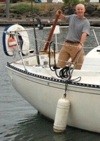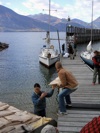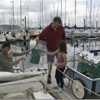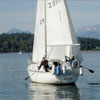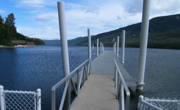|
The Sail Transport Network connects people – locally and across oceans – who are building community resilience by reviving heirloom technologies that will enable them to thrive in a fossil fuel-depleted, climate-disrupted world. We are the people – traders and sailors, farmers and craftsmen, artists and merchants – who will continue to tie your world together even as fossil fuel-based transportation recedes into the smoggy past.
|
|
|
|
|
by Diane Urbani de la Paz -- July 4, 2009
|
SEQUIM, Wash. - Let us follow a strawberry, flush from the field as it travels on wind and water - but without petroleum - from Sequim to the big, hungry city.
|
|
|
|
|
|
|
|
|
|
by Jon Steinman -- June 17, 2009
|
Part VII of The Local Grain Revolution series featured a full episode on the sailing of locally-grown grains from the Creston Valley of British Columbia to the City of Nelson.
|
|
|
|
|
|
|
|
|
|
by Jan Lundberg -- June 15, 2009
|
We're glad to report that over 60% of the food for the 10-day Village Building Convergence in Portland, Oregon was bike-carted at least in part. The food was mostly from farmers markets where the farmers donated to the Convergence's dinners. We also got the cooperation of Clever Cycles, a local business, plus creative volunteers. It all fit into an inspiring annual event.
|
|
|
|
|
|
|
|
|
|
by Dave Reid -- June 3, 2009
|
Summer 2009 Update
Sail Transport Company:
Petroleum-Free Delivery of Local Organic Produce -
Summer has finally arrived, and we here at the Sail
Transport Company are eager to start our regular
deliveries on Sunday, June 14th, through our sail and
bike-powered Community Supported Agriculture
(CSA) program.
|
|
|
|
|
|
|
|
|
|
by Deconstructing Dinner from Kootenay Co-op Radio -- May 15, 2009
|
Since March 2008, The Local Grain Revolution series has been following the evolution of Canada's first Community Supported Agriculture (CSA) project for grain.
|
|
|
|
|
|
|
|
|
|
by Jeannie Yandel and David Reid -- April 25, 2009
|
Washington state's unemployment rate has rocketed up to 9.2%. So it's not the best time to give up a steady job or start a new business. David Reid knows this, but in January he quit his job as an ultrasound engineer anyway to work full–time on his dream business. It's called Sail Transport Company.
|
|
|
|
|
|
|
|
|
|
by Jan Lundberg -- January 2, 2009
|
Culture Change Letter #226 I met David Reid in Seattle in October 2007 when he invited me to speak at the Seattle Peak Oil Awareness monthly meeting. By the time I was giving my talk, taking on questions such as whether there's validity to the techno-fix, Dave's main interest had already zeroed in: "Excuse me everyone, but we've discussed these peak oil questions enough in our meetings. Let's hear about the Sail Transport Network."
|
|
|
|
|
|
|
|
|
|
by Jan Lundberg -- December 29, 2008
|
Culture Change Letter #225 -
David Reid is an engineer from Scotland living in Seattle who became active in the peak oil awareness movement. The more he learned about the implications of dwindling energy capability for industrial society and the consumer economy, the more he might have despaired or continue to talk and talk about the crisis until there was nothing more to say.
|
|
|
|
|
|
|
|
|
|
by Ian Swan -- September 1, 2008
|
Dmitry Orlov introduces:
This is a guest post from Ian Swan. As some of you know, I have sold my shoreside residence, and for more than a year now I have been living aboard and sailing up and down the east coast of the US. I have done this both as a lifestyle choice and as a way to minimize costs, including fuel costs, and to maximize the available options. For many of you, such a dramatic change of habits is out of the question. But this is not to say that you should neglect to look at boats as an important element of your post-collapse preparations. Ian's article takes this subject, which for most people resides in the realm of daydreams, and brings it down to the level of practical reality. Unlike many sailing experts that might try to impress you with their opinions, Ian knows his stuff, and, very importantly, he isn't trying to sell you anything. So if you are one of the many people who think that having a "just in case" boat might be a good idea, but have not acted on it, this article is for you.
|
|
|
|
|
|
|
|
|
|
by Dmitry Orlov -- January 14, 2008
|
It's been about two years since I became seriously interested in sailboats. During that time, I learned a great deal about boats, sailed a variety of craft around Boston Harbor and the vicinity, bought a boat, fitted it out, moved aboard with my wife and cat, and sailed it all over the eastern seaboard -- from Maine to the Carolinas. As I write this, we are taking a break in Charleston, South Carolina, before heading further south into the Caribbean.
As a byproduct of my transition to a life afloat, in August of 2006 I wrote an article, The New Age of Sail, which some people have found quite inspiring. As happens so often, its inspirational qualities resulted to some extent from my ignorance at the time; had I known what I know now, the cold light of experience would have no doubt tempered the inspirational qualities of this text.
|
|
|
|
|

|
